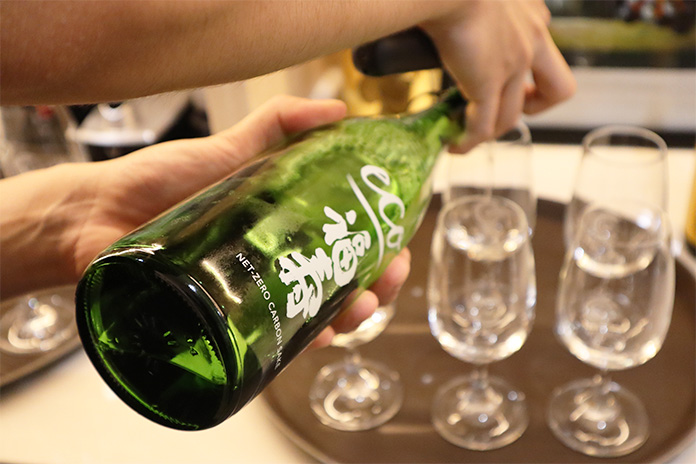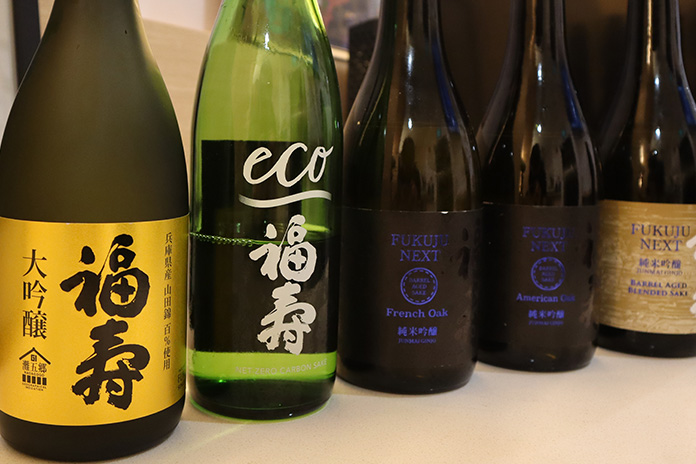
SAKE, Japan’s revered rice wine, is more than just a beverage; it’s a window into the rich history, craftsmanship, and culture of the country.
Recently, I had the privilege of attending a masterclass on Fukuju Next Sakes hosted by The Beverage Clique Academy.
Storm-Asia has previously introduced Fukuju’s beautiful sakes. This time around, the experience was extraordinary. We were introduced to five remarkable sakes, each reflecting Fukuju’s commitment to quality, innovation, and sustainability.
ALSO READ: Should A.I. Think For You?
Fukuju’s rich heritage
Established in 1751, Fukuju’s brewery is situated in the northern side of the Rokko mountain range in Kobe Japan. It boasts a location with pure granite soil that was formed over 100 million years ago. This exceptional terroir plays a vital role in shaping the distinct character of their sake. Fukuju Sake’s dedication to tradition, combined with a penchant for innovation and sustainability, make it a standout in the world of sake.
Having close to three centuries of experience, Fukuju is expanding its commitment to make the world a little more sustainable.
The Fukuju Junmai Eco Zero is a clear example. This sake comes in a label-free bottle to reduce consumption, employs a higher 80% milling rate in their eco-friendly product, and relies on carbon-neutral city gas for their operations.
Innovative practices, such as using an air washing machine to instead of water for the rice, underscore the dedication to minimising the environmental impact.
Collaborating with universities to research eco-friendly marketing strategies further strengthens their pledge to a sustainable future.

Fukuju Daiginjo
The masterclass commenced with Fukuju Daiginjo, a sake that exemplifies Fukuju’s long history of high quality, smooth and fragrant sakes. With a 50% milling rate, this sake is made from highly polished rice, resulting in a refined and elegant flavour profile. We immediately fell in love with its sweet aroma and the harmonious blend of fruitiness and floral notes.
Fukuju Junmai Eco Zero
In late 2022, the Fukuju Junmai Eco Zero was heralded as the world’s first carbon neutral sake. It is an embodiment of Fukuju Sake’s 2030 sustainability initiative, with label-free bottles and the use of carbon-neutral city gas. The sake has a light, fragrant smell and a clean, pure taste, but proved to be drier than expected with a finish that was underwhelming. Nevertheless, we felt happy to be able to enjoy a sake that concurrently contributes to the healing of Mother Earth.
Fukuju Next Junmai Ginjo Barrel Aged
The Fukuju Next Junmai Ginjo Barrel Aged sake stood out as a masterpiece of innovation. It is a blend of sakes aged in American and French oak barrels, combined with non-aged Junmai Ginjo (the blending ratio is a trade secret).
The nose is faintly woody but on tasting the rich, oaky and complex flavours, our eyes opened wide in amazement. With the unusual mix of aroma and the interplay of flavours, one could easily forget that this was a sake as the oaky tastes kept hinting to our brains about wines and whiskeys.
Certainly a refreshing surprise!
Fukuju Next Junmai Ginjo American Oak
This American Oak-aged Junmai Ginjo revealed a bold and robust character. With a 60% milling rate and an elevated alcohol content, it delivered a captivating experience. The infusion of vanilla and caramel notes from the American oak barrels, over a short period of under three months, created a sensory delight that showcased Fukuju Sake’s creativity in crafting a distinctive and memorable sake.
If we could describe sakes like how we describe red wines, then this should be considered a heavier, fuller-bodied sake than the Ginjo Barrel Aged.
Fukuju Next Junmai Ginjo French Oak
The Fukuju Next Junmai Ginjo French Oak displayed a refined complexity with subtle spice and a delicate tannic structure. On the nose and the palate, this sake is distinctly different from the one aged in American oak.
It is a pleasant surprise to see this result of Fukuju Sake’s efforts in research and development and their mastery of aging sakes in oak barrels, again under three months, and how that could add so much diversity in how the sake expressed itself.
It will take some time for sake drinkers to wrap our heads around the heavy, woody flavours. While the flagship Fukuju Daiginjo is priced at a moderately palatable $109 per bottle, the small production batches of the Eco Zero and the barrel aged sakes demand higher price points at around the $200 per bottle mark.
All said, this Fukuju Sake masterclass was an exploration of contrasts between tradition versus innovation. Each sake variety unveiled a facet of Fukuju’s excellence, from their dedication to quality and precision to their embrace of eco-friendly practices and innovative techniques.
The new sakes bear testament to Fukuju’s willingness to push the boundaries of traditional sake-making. The representatives revealed that Fukuju is experimenting with beverages that smell and taste like sake, but are alcohol free, which will appeal to a different market segment.
We can’t (not) wait to get a taste of that!



















